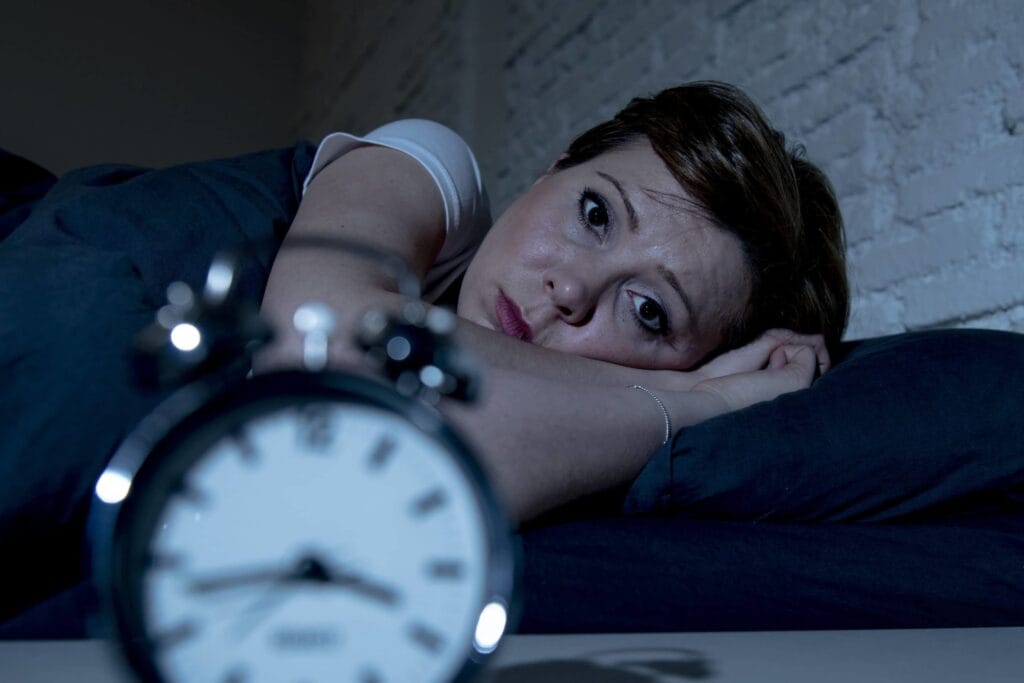
Sleep isn’t a luxury—it’s essential.
But for many people, insomnia turns bedtime into a nightly struggle. At OneMedicine, we understand how exhausting it is to lie awake, night after night. Whether you’re having trouble falling asleep, waking too early, or feeling unrefreshed each morning, support is available.
We take a holistic approach—starting with healthy sleep habits, and offering medical treatments where needed. With the right help, better sleep is possible.
What Is Insomnia?
Insomnia means difficulty getting to sleep, staying asleep, or waking too early and being unable to get back to sleep. It can be:
- Short-term, triggered by stress, illness, or life events
- Chronic, lasting more than 3 months, and often linked to underlying conditions like anxiety or depression
Insomnia can affect your energy, mood, concentration, and overall health. Fortunately, it’s also highly treatable—especially when approached with the right care.
Start With Sleep Hygiene
Before considering medications, we always begin with sleep hygiene. These are simple but powerful lifestyle changes that help reset your body’s natural sleep rhythm and improve sleep quality.
✔ Stick to a Consistent Sleep Schedule
Go to bed and wake up at the same time every day—even on weekends. A regular pattern helps your body clock stabilise, making sleep more automatic.
✔ Create a Wind-Down Routine
Start relaxing at least 30–60 minutes before bed. This helps signal to your brain that it’s time to rest. Try:
– A warm bath or shower
– Soft music
– Gentle stretches or breathing exercises
– Reading a physical book (not on a screen)
– Journaling or gratitude reflection
✔ Limit Screens and Blue Light
Phones, tablets, and laptops emit blue light that interferes with melatonin production—the hormone that helps you sleep. Avoid screens at least an hour before bed or use a blue light filter if you must.
✔ Optimise Your Sleep Environment
– Keep your room cool, quiet, and dark
– Use blackout curtains or an eye mask
– Remove or cover bright LEDs (alarm clocks, chargers)
– Use earplugs or white noise if needed
– Make sure your mattress and pillows are comfortable and supportive
✔ Avoid Stimulants and Alcohol Late in the Day
– Limit caffeine (coffee, tea, energy drinks) after 2 PM
– Skip alcohol in the evening—it may make you feel sleepy at first, but disrupts deep sleep later
✔ Avoid Heavy Meals Before Bed
Eating large, rich, or spicy meals before bed can cause indigestion or reflux. Aim to finish eating at least 2–3 hours before you sleep.
✔ Use Your Bed for Sleep Only
Train your brain to link the bed with sleep—not work, scrolling, or TV. If you can’t fall asleep after 20–30 minutes, get up, do something quiet in dim light, and return only when sleepy.
✔ Stay Active—But Not Too Late
Daily exercise promotes better sleep, but intense activity right before bed can be stimulating. Morning or afternoon workouts are best.
Making even small improvements in sleep hygiene can significantly improve sleep—often without the need for medication.
Medical Treatments for Insomnia
When lifestyle changes aren’t enough, we may consider short-term medication support. These are always prescribed carefully, based on your individual situation.
1. Sedating Antihistamines
These are sometimes used for short-term sleep support.
Examples: Promethazine, diphenhydramine (e.g. Nytol)
✔ Pros: Readily available, mildly sedating
✘ Cons: Drowsiness next day, dry mouth, dizziness, not suitable long-term
2. Z-Drugs
Commonly prescribed for short-term insomnia.
Examples: Zopiclone, zolpidem
✔ Pros: Fast-acting, helps with falling and staying asleep
✘ Cons:
– Next-day grogginess
– Dependence risk
– May cause sleepwalking or unusual behaviours
– Not suitable for long-term use
3. Benzodiazepines
These older sedatives are sometimes prescribed short-term for severe or anxiety-related insomnia.
Examples: Temazepam, diazepam
✔ Pros:
– Fast-acting
– Can help break cycles of acute stress-related insomnia
✘ Cons:
– High risk of dependence and tolerance
– Daytime drowsiness, slowed reaction time
– Impaired concentration and coordination
– Linked to long-term memory problems and cognitive decline with sustained use
– May reduce deep sleep quality over time
Note: Benzodiazepines are not recommended as a long-term solution for insomnia. They may be used in carefully selected cases for short durations under close supervision.
4. Melatonin (and Melatonin Agonists)
Melatonin is the hormone your body naturally produces at night.
Example: Circadin (prescription prolonged-release melatonin)
✔ Pros: Non-habit forming, supports natural sleep rhythm
✘ Cons:
– Can take days to work
– Less effective for severe insomnia
– Not suitable for everyone (e.g. liver conditions)
5. Sedating Antidepressants
These may be helpful if your insomnia is linked to anxiety or low mood.
Examples: Mirtazapine, amitriptyline, trazodone
✔ Pros: Dual benefit—helps both mood and sleep
✘ Cons:
– Grogginess
– Weight gain (especially mirtazapine)
– Used at low doses and often off-label
6. Herbal Remedies and Supplements
Some people prefer to try natural or over-the-counter options to support their sleep. Common choices include valerian root, a traditional herbal sedative with a calming effect—though it has a strong smell, may interact with certain medications, and evidence for its effectiveness remains limited. Chamomile, often taken as a tea, is another gentle option known for its relaxing properties, though its effects can be subtle and vary between individuals.
CBD (cannabidiol) is gaining popularity for reducing anxiety and promoting relaxation, but product quality can be inconsistent and regulation is limited. It’s also important to consider potential interactions with other medications. Lastly, magnesium—a vital mineral involved in nerve and muscle relaxation—may help if you have a deficiency, but high doses can sometimes cause digestive upset.
While these remedies are widely used, it’s important to remember that “natural” doesn’t always mean safe. Always speak with your GP before starting any herbal or over-the-counter sleep aids, especially if you’re taking other medications or managing a health condition.
What We Recommend at OneMedicine
We believe in a thoughtful, whole-person approach. That means starting with the basics: healthy sleep habits, stress management, and identifying any deeper causes like anxiety, hormone changes, or mood issues.
Medication, if used, is always short-term, targeted, and monitored closely. We’ll also help you plan how to safely come off any sleep medications if needed.
Take the First Step Toward Better Sleep
You don’t have to live with poor sleep. At OneMedicine, we’ll work with you to find what’s keeping you awake—and guide you back toward deep, restorative rest.
✔ Book a consultation today
Let’s get your sleep—and your energy—back on track.
















